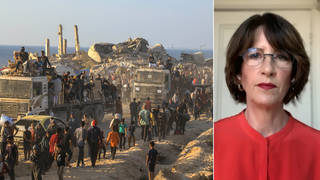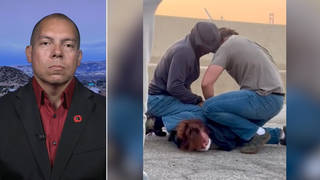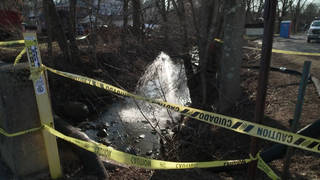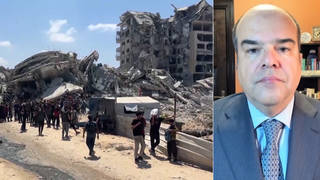
Guests
- Emily Wrightdevelopment director for River Valley Organizing, a community group in the Ohio River Valley, and resident of Columbiana County.
- Ross Grooterslocomotive engineer and co-chair of Railroad Workers United.
- Julia Rockinvestigative reporter with The Lever.
Fears of a wider health and environmental disaster are growing, after a 150-car freight train operated by Norfolk Southern derailed and a so-called controlled burn released toxic chemicals last week in East Palestine, Ohio. Residents reported seeing a fireball and mushroom cloud of smoke fill the skyline. Data released by the Environmental Protection Agency shows the train contained more toxic and carcinogenic chemicals than initially reported, including phosgene, a poisonous gas that has been used as a chemical weapon in war. Officials lifted an evacuation order for residents last Wednesday, saying the air and water were safe, but residents have reported sore throats, burning eyes and respiratory problems, and wildlife has been found dead. Meanwhile, scrutiny has turned onto Norfolk Southern, which in recent years has challenged regulatory laws aimed at making the rail industry safer and made mass cuts to railroad staffing while spending billions on stock buybacks and executive compensation. We get an update from Emily Wright, community organizer based near the site of the derailment; Ross Grooters, a locomotive engineer and co-chair of Railroad Workers United; and Julia Rock, an investigative reporter with The Lever.
Transcript
AMY GOODMAN: This is Democracy Now!, democracynow.org, The War and Peace Report. I’m Amy Goodman, with Juan González, as we turn to Ohio, where residents of East Palestine are living the real-life version of the Oscar-nominated Netflix movie some helped make when they were extras in that film. This is part of the trailer for White Noise, about a suburban community that faces a so-called “airborne toxic event” after a train wreck causes a chemical leak.
TV VOICE: Something that could actually kill someone.
JACK: [played by Adam Driver] Let’s watch a sitcom or something.
KIDS: No!
HEINRICH: [played by Sam Nivola] They’re calling it the airborne toxic event.
JACK: It won’t come this way.
STEFFIE: [played by May Nivola] Will we have to leave our home?
JACK: Of course not.
STEFFIE: How do you know?
JACK: I just know.
BABETTE: [played by Greta Gerwig] OK. What if it’s dangerous?
POLICE OFFICER: Evacuate all places of residence.
JACK: We have a situation.
AMY GOODMAN: White Noise stars Greta Gerwig and Adam Driver. But in real-life Palestine, Ohio, fears of a wider health and environmental disaster are growing after a 150-car freight train operated by Norfolk Southern derailed and released toxic chemicals last week, yes, in the community of East Palestine near Ohio’s border with Pennsylvania.
Data released by the Environmental Protection Agency shows the train contained more toxic and carcinogenic chemicals than initially reported. The EPA also said, quote, “materials released during the [derailment] were observed and detected in samples from Sulphur Run, Leslie Run, Bull Creek, North Fork Little Beaver Creek, [Little Beaver Creek,] and the Ohio River.” The Ohio Department of Natural Resources estimates the spill killed more than 3,500 fish in surrounding waterways. Chickens have been found dead in their coops. Residents have reported sore throats, burning eyes and respiratory problems. A controlled burn of the chemicals following the derailment sent a mushroom cloud of smoke and fire into the air that contained the toxic chemicals. Surveillance footage also shows the train on fire about 20 miles before it derailed with hazardous chemicals as it passed through Salem, Ohio. Officials lifted an evacuation order for residents Wednesday, saying the air and water are safe.
For more, we’re joined by three guests. Ross Grooters is with us, a locomotive engineer, co-chair of Railroad Workers United. Julia Rock joins us, an investigative reporter with The Lever who has been following the derailment in Ohio, her pieces headlined “There Will Be More Derailments” and “Rail Companies Blocked Safety Rules Before Ohio Derailment.” But we begin with Emily Wright, a resident of Columbiana County in Ohio, a few miles from the derailment and explosion site in East Palestine. She’s also the development director for River Valley Organizing, which is working with residents to call for justice-centered healing.
Emily, can you describe the scene of what you’re calling a chemically driven environmental nightmare? What does it look like, smell like? Describe what happened when the train derailed and how you learned about how you had to protect yourself.
EMILY WRIGHT: Good morning. Thanks for having me on.
One of the things that I really want people to know is that this event has kind of three parts. So, Friday night, we had the derailment around 9 p.m., in between 9:00 and 10:00. And residents that were right at the site, you know, were evacuated.
Then, the next day, they evacuated more people on Saturday, because it was still burning. And at this time, we didn’t know what was on the cars. We heard maybe it was vinyl chloride, maybe it was 10 cars, maybe it was five. We really didn’t have a great picture of what was on the train. So we were told that if you were with — outside of that mile zone, you’re OK. I live a few short miles — I think on the tracks, there’s five miles in between where I’m at and where the derailment was. And, you know, you should be OK. And they kept saying the same thing over and over again on the media and in the press conferences: “There’s no toxins in the air. There’s no toxins. You know, don’t worry.”
Sunday night, we had heard — we got an alert on our phone that there had been an additional explosion and that the fire was out of control again, which it never really was in control. We have pictures and videos that — time-stamped clear through — that show it, it was burning, and to just be aware. Like, there was really no evacuation for us, just people that were a little bit further out from the radius.
They were concerned on Monday morning that we were going to have an explosion. I will give everybody, you know, this much, that the explosion could have been much, much worse. So they announced to everybody that they were going to do a “controlled” release. And I’m using air quotes when I say “controlled.” So, they were supposed to do it at 3:30. My daughter was going to be on the bus route at that time. I already was experiencing symptoms of — I have asthma, so I was having shortness of breath already and was concerned, you know, from that burn, I already had irritation. But when they did the release, they were supposed to do it at 3:30 p.m., they announced on a huge, you know, press conference. Mike DeWine was there. All of the sudden, they stopped the press conference. They evacuated DeWine. We work with a lot of — you know, we’re nonpartisan, nonprofit, so we work with a lot of — you know, both sides of the aisle — politicians, and had, you know, got confirmation that he had been rushed out of there. The media was given five minutes to get out, that they were pretty sure an explosion was imminent. So they did not do the burn at 3:30. I can’t tell you why. They did it two hours later.
The problem is, we had forecasted high wind gusts up to 45 miles an hour. We get a lot of wind in our area. The hills usually break it up, but it was announced that it was going to be very windy. So what they wanted to do was let it off earlier, so the cloud would go — I’m sorry, one second, my voice — so the cloud would go straight up. It wouldn’t span out. So they let it off late. And instead, the winds caught it. It went over four counties, four to five counties, in two states — actually, three, because the Panhandle of West Virginia was also affected. So we have Ohio, Pennsylvania, West Virginia all affected by this huge mushroom cloud. You’ve all seen the pictures, I’m sure.
We started in my home, being just a few short miles away, experiencing nausea — sorry to be explicit, but — diarrhea. My father has bilateral asbestosis from working in the mill. So, these industries are killing us in more than one way. And he couldn’t breathe well. And, you know, I wanted to evacuate. We had family that was telling us to come. But then, there was this massive shelter-in-place order put out: “Do not be out if you don’t have to. Shelter in place” — in the same breath of we’re hearing on a press conference and on the news, “This is out of an extreme abundance of caution. There’s no toxins. There’s no toxins. There’s no toxins. There’s no toxins.” That’s all we kept hearing.
But the only thing I really want to highlight — and I’m sorry if I’m going on too much — is what we found out through the org. We’ve been on the ground talking with people. We’re actually investing — our offices are in East Liverpool, Ohio, which is just a little bit south of East Palestine. But we have a lot of members of our org that live, like me, in and around East Palestine. So, we’ve invested in the community and are bringing on a couple organizers that are right outside the front door of the derailment, you know, to work with people, because, from day one, we’ve been fed what wasn’t the truth. And now we find out with this EPA report that, what, over 10,000 gallons of oil went into the ground, that the vinyl chloride was like double what we thought, and there was diethylene glycol, and there’s other chemicals. Norfolk Southern, from what the EPA says, did not report this to the EPA in a timely manner. So, we know this is on the report.
JUAN GONZÁLEZ: Well, Emily, I’d like to — Emily, if I can, I’d like to bring in Ross Grooters, as a locomotive engineer and co-chair of Railroad Workers United. Ross, your reaction to this derailment and fire, also this report that the fire had actually started before the derailment? What is the normal procedure that is supposed to occur in situations like this? And what your assessment of this crisis is at this moment?
ROSS GROOTERS: Yeah. Thank you, Juan.
None of this really comes as a surprise. There’s deep systemic issues. You talk about the normal response to an event like this. This isn’t a normal event. And we really haven’t seen anything like it in the United States, and probably not something like it since 2013, as you know, when we had the Quebec train derailment and explosion in Lac-Mégantic. There are deep systemic problems with the freight railroads right now, and those need to be addressed for us to have some sort of a normal response to events like this. And until we get at those root causes of the safety issues in the freight rail system in this country, it’s not a matter of if these events are going to disrupt and really — just what the people of East Palestine are going through is just — it’s heart-wrenching. That’s going to occur again. It’s just a matter of when and where.
JUAN GONZÁLEZ: And what are some of the things that need to be addressed?
ROSS GROOTERS: Well, at the root of it all is really cutbacks to staffing. You have companies that are making obscene amounts of money, and they’re doing so by adopting operating policies — there’s a whole system for this called precision scheduled railroading — that is just designed to maximize profits. And what that means is you’re cutting to the bone the amount of people doing the job. So you have fewer people doing a lot more work faster. You have across-the-board cutbacks on the maintenance of cars, on the maintenance of locomotives, on the maintenance of track. This is critical infrastructure. And those things are being done, in many cases, by skeleton crews or are outsourced to subcontractors. And then you have increasingly long and heavy trains, like the one we saw here, where these trains have a greater propensity to derail. They’re going to derail more frequently because they are longer and heavier.
And then, lastly, you have the railroads themselves who are fighting any kind of regulation, whether it be train control systems that help manage the signal system, or the lobbying efforts that we saw to kill electronic breaking, which can make for safer operations and a quicker stop, should a derailment like this occur.
AMY GOODMAN: You know, we’re going to go to Julia Rock in a minute, the reporter who’s covering this for The Lever, but I wanted to give Emily 30 seconds, as you sit there, sometimes coughing, dealing with what you’re done with. And by the way, I can only say I think about Juan, his reporting after 9/11. You were talking about the EPA at the time, Christine Todd Whitman, the former governor of New Jersey, saying that after 9/11 attacks, the air was fine. And Juan’s reporting led, exposing the lie of that, to the Daily News winning a Pulitzer Prize. So, Emily, your last 30 seconds on Democracy Now! right now: What do you think is most important for people to understand?
EMILY WRIGHT: OK. The most important thing is that this is not a conspiracy theory. This is standard operating procedure for Norfolk Southern. They have 70 million in safety violations since 2000, and they have 21 million in environmental, just in environmental. Twenty-five million Americans live on an oil train blast zone. Twenty-five million Americans. This is in the poorest parts of America, going from Conway, Illinois, to Pennsylvania, cutting through Appalachia. You know, they continue to do, you know, safety issues, lower safety concerns, not worry about us, because we are the people that historically cannot fight back.
So, what we’re going to do with River Valley Organizing is we’re going to offer free soil and water testing to people so we can actually figure out what’s going on. We have the University of Pittsburgh and the University of Kentucky on board to do long-range studies, because after the immediate aftermath, these people are going to need people to advocate for them. And, you know, like I said, I —
AMY GOODMAN: Ten seconds.
EMILY WRIGHT: I have several family members that have cancer or asthma or COPD from these industries. And we really need them to stop killing us. And we told them 10 years ago. We told the EPA that bomb trains, this was going to happen. We had several collaborative organizations appeal to the EPA. And it happened. So I hope —
AMY GOODMAN: Emily, we clearly are going to come back to you in these coming days —
EMILY WRIGHT: That’s it.
AMY GOODMAN: — because there’s so much to talk about.
EMILY WRIGHT: Sure. Thanks so much.
AMY GOODMAN: Emily Wright, with River Valley Organizing, right next to East Palestine in Ohio. Ross, in 30 seconds, can you respond to the joint effort by the Republicans and the Democrats, the bill that was signed off on by Biden, the law prohibiting a rail strike and imposing a deal rejected by over half the unionized railroad workers? And then we’re going to go to Julia Rock.
ROSS GROOTERS: Yeah. Thank you, Amy. Railroad workers have been fighting through the contract negotiation process for relief from the conditions, which are very stressful and very demanding and have been exacerbated by precision scheduled railroading and the corporate greed. We’ve been trying to get relief from that. That would certainly help us in responding to and better managing our jobs to ensure that this doesn’t happen. But this isn’t going to be solved by one labor contract. It is systemic, and it needs some regulation. It needs regulators to step in and correct this, or we’re going to continue to see things like what happened in Ohio a couple weeks ago.
JUAN GONZÁLEZ: Yeah, I’d like to bring in Julia Rock, the investigative reporter with The Lever who’s been following the derailment in Ohio. Julia, talk about this issue of the railroad companies convincing government officials to repeal brake rules.
JULIA ROCK: Yeah. So, this is a story about the Obama administration attempting to require trains carrying hazardous materials, as well as crude oil, to install much better braking systems on the trains, electronically controlled brakes rather than the air brake systems currently used on trains, designed during the Civil War era, which stopped trains one car at a time. And first, the railroad industry fought the Obama rules. They lobbied really hard against them. They argued it would be terrible for business; it would negatively impact the fluidity of the nation’s rail system. And then, when Trump came into office, they turned around and pushed for Trump to repeal the brake rules that the Obama administration had enacted, which he did.
AMY GOODMAN: So, we’re talking about rules that went back to the Civil War? They haven’t been updated?
JULIA ROCK: So, the brakes currently on America’s freight trains are air brakes, which function by stopping train cars one at a time using pressure that travels along the pipe, along the train. And that is a braking system that was designed in 1868.
AMY GOODMAN: Astounding. You have 10 seconds for a final comment about what people should understand about East Palestine right now.
JULIA ROCK: So, yeah, this is the result of efforts by the railroad industry to ensure that they do not have to retrofit trains carrying hazardous materials and crude oil with safety features.
AMY GOODMAN: Well, we want to thank you so much for being with us, Julia Rock of The Lever; Ross Grooters, locomotive engineer and co-chair of Railroad Workers United; and Emily Wright of River Valley Organizing.
That does it for our show. Democracy Now! is produced with Renée Feltz, Mike Burke, Deena Guzder, Messiah Rhodes, Nermeen Shaikh, María Taracena, Tami Woronoff, Charina Nadura, Sam Alcoff, Tey-Marie Astudillo, John Hamilton, Robby Karran, Hany Massoud and Sonyi Lopez. Our executive director is Julie Crosby. Happy birthday, Brendan Allen. I’m Amy Goodman, with Juan González.













Media Options